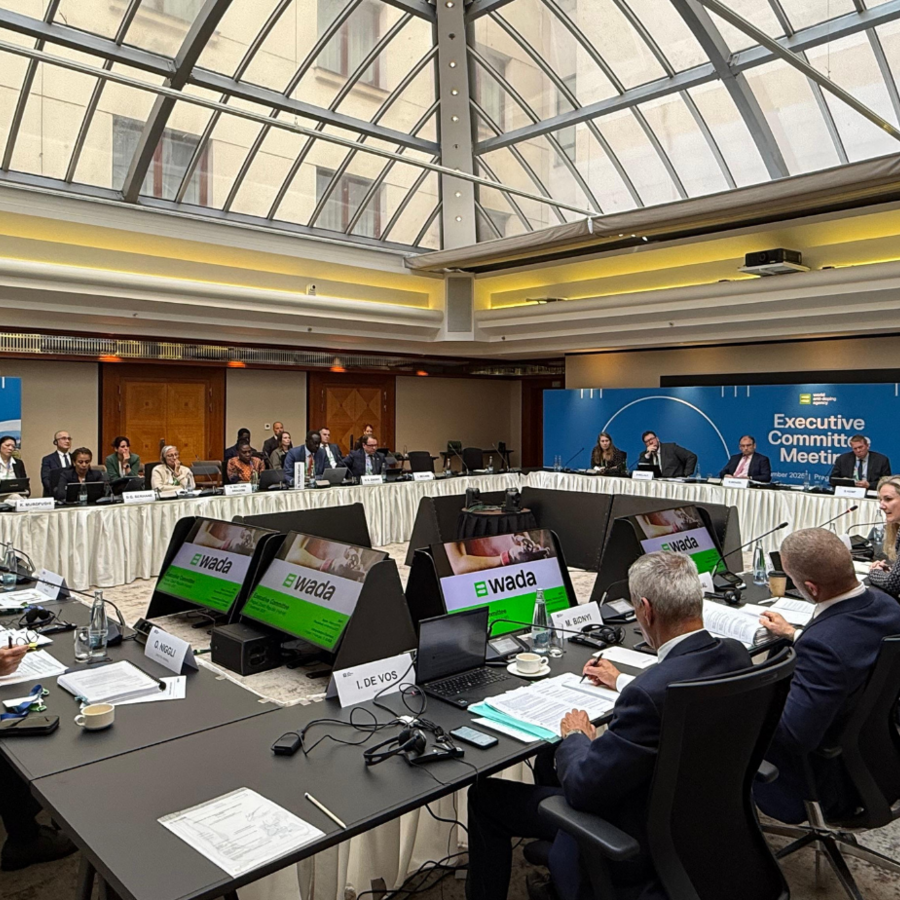Releases
WADA Executive Committee approves 2026 Prohibited List and alleges non-compliance on Kenyan National Anti-Doping Organization
Executive Committee also approved decisions regarding Scientific Research Grants, Laboratories and Technical Documents

Today, the World Anti-Doping Agency’s (WADA’s) Executive Committee ExCo) held its second meeting of the year in Prague, Czechia, which was graciously hosted by the Czech Anti-Doping Committee (CADC). Thanks also go to the Government of the Czech Republic and the Czech Olympic Committee. The ExCo discussed a range of topics, took a number of decisions – the main ones being summarized below – and made recommendations to the Agency’s Foundation Board (Board) for its next meeting in early December 2025.
After the meeting, WADA President, Witold Bańka, said: “Today, WADA’s Executive Committee dealt with a packed agenda, which included approval of the 2026 List of Prohibited Substances and Methods, compliance matters and other important decisions and recommendations that will further strengthen WADA and the global anti-doping system. I would like to thank the members for their engagement as we continue to lead a global collaborative movement for doping-free sport.”
2026 List of Prohibited Substances and Methods
The ExCo approved the 2026 List of Prohibited Substances and Methods (List), which designates the substances and methods that are prohibited under the World Anti-Doping Code (Code). The ExCo also approved the composition of the substances that will feature on the 2026 Monitoring Program, which includes substances that are not on the List but that WADA wishes to monitor in order to detect potential patterns of misuse in sport. There will be a limited number of modifications to both documents for 2026 as compared with those currently in force. The 2026 List will be published before 1 October 2025 and will enter into effect on 1 January 2026.
Compliance with the World Anti-Doping Code
The ExCo followed the recommendations from the independent Compliance Review Committee (CRC) to allege the Kenyan National Anti-Doping Organization (NADO) as non-compliant with the World Anti-Doping Code (Code) as it has still not addressed several critical requirements following an audit carried out by WADA in May 2024.
The proposed consequences and reinstatement conditions for the Kenya NADO can be found here.
Under Article 9.3.1 of the International Standard for Code Compliance by Signatories (ISCCS), the Signatory has 21 days following the date of receipt of the formal notice of non-compliance to dispute WADA’s allegation of non-compliance, as well as the proposed consequences and/or the reinstatement conditions proposed by the Agency. It should be noted that the decision (including the consequences) will enter into force on 2 October 2025, unless the decision is challenged before the same date.
The ExCo also approved the recommendation from the CRC to add the Côte D'Ivoire NADO and the International Powerlifting Federation (IPF) to the compliance ‘watchlist’, giving these Signatories four months to address outstanding non-conformities. The Côte D'Ivoire NADO has been added to the ‘watchlist’ in relation to its failure to address non-conformities identified through the Code Compliance Questionnaire (CCQ) exercise while the IPF has still not addressed several critical requirements following an audit carried out by WADA in October 2024.
Both these Signatories submitted a corrective action plan explaining to the satisfaction of the CRC how they intend to address the non-conformities within the four-month period of the ‘watchlist’ therefore meeting the criteria of the ‘watchlist’ as stated in Article 8.4.5 of the ISCCS. By being placed on the ‘watchlist’, if either Signatory fails to correct its outstanding non-conformities within the timeline, as per Article 8.4.5 of the ISCCS, WADA shall automatically send a formal notice alleging non-compliance and proposing consequences and reinstatement conditions.
The ExCo also followed the CRC’s recommendation to reinstate as compliant, with immediate effect, the International Federation of Basque Pelota (FIPV), which had been non-compliant since October 2024. The non-compliance was the result of failure to address non-conformities identified through the CCQ exercise in 2023 in testing. The CRC confirmed to the ExCo that the previously stated reinstatement conditions had been successfully addressed by the FIPV.
There are currently three non-compliant Code Signatories, namely the Russian and Sri Lankan NADOs, and the International Fitness and Bodybuilding Federation. For more information on these Code Signatories and their respective consequences, please visit the ‘Global list of non-compliant signatories and applicable consequences’ page of WADA’s website.
WADA Director General, Olivier Niggli, said: “It is always disappointing when a Signatory to the World Anti-Doping Code is alleged as non-compliant. However, it is crucially important for the global system that Anti-Doping Organizations are held to the same high standards that we expect from athletes. We will continue to work with all non-compliant organizations to improve their programs so they can address their non-conformities and restore their compliance status for the good of athletes, both inside those countries and internationally.”
World Anti-Doping Code and International Standards Update Process
The ExCo was briefed on the main activities undertaken in recent months regarding the 2027 World Anti-Doping Code (Code) and International Standards (Standards) Update process.
With the process having launched in 2023, the third and final stakeholder consultation phase closed on 30 May 2025 with a total of 1,698 comments having been received regarding the second drafts of the 2027 Code and Standards. As part of that third phase, an athlete-centered consultation was conducted, in collaboration with WADA’s Athlete Council. More than 600 individual athletes or athlete commissions from in excess of 60 countries and 70 sports contributed to this part of the consultation process.
The Code and International Standards Drafting Teams have continued to meet and will consider comments made by the ExCo members when preparing the final versions of the Code and Standards. These will be submitted for formal approval and adoption by the Board (Code) and ExCo (Standards) when they meet next during the Sixth World Conference on Doping in Sport, in Busan, Republic of Korea in December. The updated versions of the Code and Standards will come into force on 1 January 2027.
Athlete Council
The ExCo received a progress report from the Chair of the Athlete Council, Ryan Pini, related to various matters including the Council’s Action Plan, member participation at several international and continental athlete forums, and the Council’s active role in the Code and Standards Update.
Mr. Pini also reported on the Council’s work related to the Athletes’ Anti-Doping Rights Act, which is undergoing a comprehensive review in line with the Code and Standards Update. Building on the foundational work of the former WADA Athlete Committee, this review is strengthening athlete rights contained within the Act, clarifying procedural protections, and ensuring continued alignment with evolving anti-doping standards and athlete needs. The Act is a non-binding reference document designed to help athletes and stakeholders interpret and apply athletes’ rights consistently. The latest version was submitted to the ExCo for initial discussion and feedback today ahead of a final version being proposed for approval by the ExCo in December 2025.
Human Rights Impact Assessment
Independent expert Snežana Samardzic-Markovic updated the ExCo on progress related to an Initial Human Rights Impact Assessment initiated in March 2023 that will be delivered to the Board for adoption at its next meeting in December 2025. When finalized, the Assessment will aid WADA’s further understanding of how anti-doping regulations, policies and programs may adversely impact on the human rights of athletes and identify possible improvements that could be made. Ensuring an athlete-centered approach, the Assessment examines not only norms and policy, but how anti-doping rules are being applied in practice.
Annual Audit of the Intelligence and Investigations Department
The ExCo approved the report of the 2025 annual audit of WADA’s independent Intelligence and Investigations (I&I) Department, which was carried out by independent supervisor, Emmanuel Leclaire, in June 2025. The purpose of the audit is to ensure that WADA I&I’s work continuously and rigorously satisfies investigative best practices, legal requirements, and complies with the Code and Standards. In keeping with policy, the audit’s conclusions will soon be made public on WADA’s website.
Implementation of Recommendations Following Cottier Report
The ExCo received an update related to the implementation of recommendations by the Working Group set up following the September 2024 report by the Independent Prosecutor, Eric Cottier, who reviewed WADA’s handling of the China Anti-Doping Agency’s no-fault contamination cases involving 23 swimmers from China in 2021.
The recommendations, designed to further strengthen anti-doping rules and WADA’s administrative processes, focus broadly on the technical areas of information technology and the Anti-Doping Administration Management System [ADAMS], intelligence and investigations, and legal affairs, as well as enhancements to the Code and related Standards, and the issue of NADOs’ operational independence.
Since the recommendations were unanimously approved by the ExCo in December 2024, WADA Management has made significant progress in implementing them in accordance with the timeline suggested by the Working Group. Over time, WADA is confident that these improvements will seamlessly integrate into the Agency's normal work environment and significantly enhance its readiness and resilience when tackling high-risk cases.
Governance
The ExCo approved the recommendation of the Agency’s Nominations Committee (NomsComm) to make the following appointments as Chairs of WADA Standing Committees, for three-year terms commencing 1 January 2026:
- Education Committee – Kady Kanouté Tounkara OLY (reappointment);
- Finance & Administration Committee – Dr. Karl Stoss (replacing Ng Ser Miang, who completes his term); and
- Health, Medical & Research Committee – Prof. Lars Engebretsen (reappointment).
The ExCo also approved the reappointment of Henry Gourdji as Chair of the CRC for an additional two-year term beginning on 1 January 2026, as well as the reappointment of Dr. Michael Petrou as the Public Authorities nominee for an additional three-year term, commencing on the same date. A recruitment process is also underway for an independent member on the CRC, for a three-year term beginning on 1 January 2026.
The ExCo approved the recommendation of the NomsComm to reappoint Kashif Farooq for a second term as independent expert member and Vice-Chair of WADA’s Risk and Audit Committee. Mr. Farooq’s new three-year term will begin on 22 September 2025.
The ExCo endorsed the request of WADA’s Working Group on NADO Operational Independence to extend the group’s mandate by four additional months to March 2026. The extension will allow the Group to ensure that its recommendations are based on the 2027 Code, which will be submitted to the Board for approval in December 2025.
Finance
The ExCo has recommended to the Foundation Board to increase annual contributions to the Agency by 3% for each of the next three years (2026-2028). These increases are being recommended in order to meet additional investments pledged for the areas of technology, compliance monitoring, results management (including appeals), and scientific research. The Board will meet next on 5 December in Busan, Republic of Korea, when it will consider this recommendation.
2025 Scientific Research Grants (Cycle 2)
The ExCo approved funding recommendations for research proposals received as part of Cycle 2 of WADA’s 2025 Scientific Research Grant Program. In all, 17 projects were selected for funding, from a total of 49 expressions of interest that led to the receipt of 26 full applications. In total, the grants amount to USD 2,164,401. Details of these projects will be published on WADA’s website shortly. The remaining funds in the 2025 research budget will be used to support Cycle 3, regarding which decisions will be taken in December 2025, and be allocated to already identified targeted projects in areas such as glucocorticoids, contaminants, and reference materials. Grants awarded during Cycle 1 of the 2025 process were announced in March 2025.
Laboratories
The ExCo approved the ‘Laboratoire Mohammed VI Antidopage’, based in Casablanca, Morrocco to conduct blood analyses exclusively in support of the Athlete Biological Passport (ABP). Following the review process led by WADA’s Science Department and Laboratory Expert Advisory Group (LabEAG), it was determined that the laboratory had successfully completed the various technical and administrative steps of WADA’s ABP approval process as established in the International Standard for Laboratories (ISL).
The ExCo also agreed to grant Candidate ABP Laboratory Status to the National Doping Testing Laboratory (LNDD), located in Algiers, Algeria, and to the Ethiopian Public Health Institute Laboratory, located in Addis Ababa, Ethiopia. These decisions follow recommendations from WADA’s LabEAG, which determined that the laboratories’ applications conformed with the relevant section (Article 4) of the ISL. The LabEAG will now evaluate the Candidate Laboratories’ progress in fulfilling all ISL requirements, including the development of their technical and analytical capabilities.
Technical Documents and Letters
The ExCo approved a revised version of the Technical Document for Dried Blood Spot doping control requirements and procedures for analytical testing and sample storage (TD2026DBS), as well as a new Technical Document for the detection of Homologous Blood Transfusion by flow cytometry (TD2026HBT) and a new Technical Letter related to the analysis and reporting of clomiphene. The Technical Documents and the Technical Letter will be published and circulated to all Anti-Doping Organizations shortly and will come into effect on 1 January 2026.
Note: Technical Documents contain mandatory requirements on specific anti-doping topics as per an in-force International Standard. Technical Letters are additional mandatory technical requirements provided by WADA from time to time, to address particular issues relating to the analysis, interpretation and reporting of specific prohibited substances and/or method or to the application of specific laboratory or ABP procedures.
Future Meetings
The next meeting of the ExCo will take place on 2 December 2025 in Busan, Republic of Korea, before the Sixth World Conference on Doping in Sport. The ExCo and Board will also meet on the morning of 5 December 2025 to approve the Standards and Code, respectively, prior to the Conference endorsing them.
Other WADA meetings in 2026 will include:
Baku, Azerbaijan
- 17 March 2026, ExCo
- 18-19 March 2026, Europe Regional Symposium
Buenos Aires, Argentina
- 10 September 2026, ExCo
Manama, Bahrain
- 25 November 2026, ExCo
- 26 November 2026, Board

